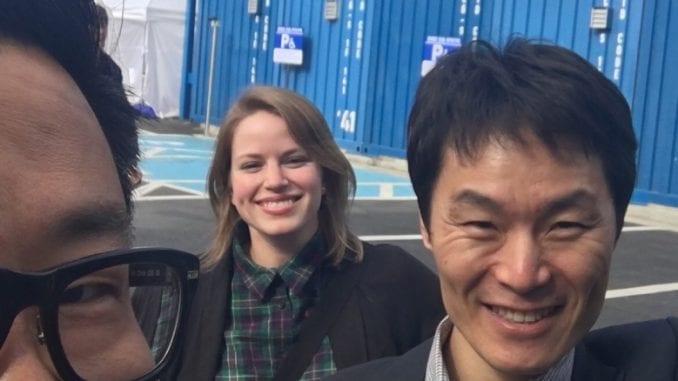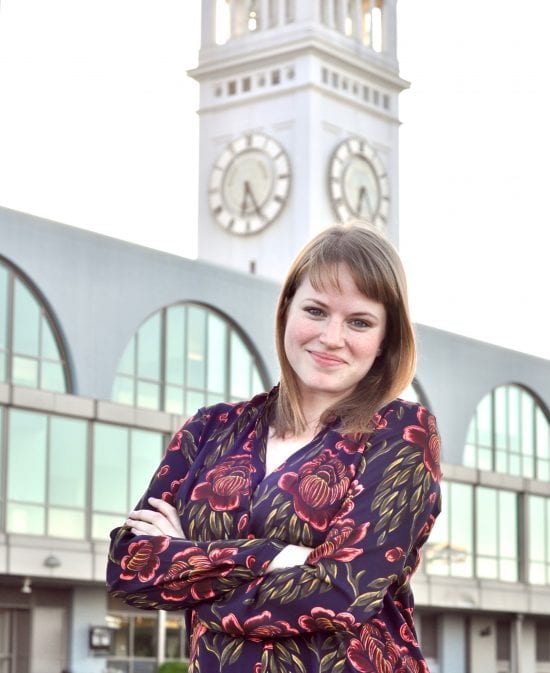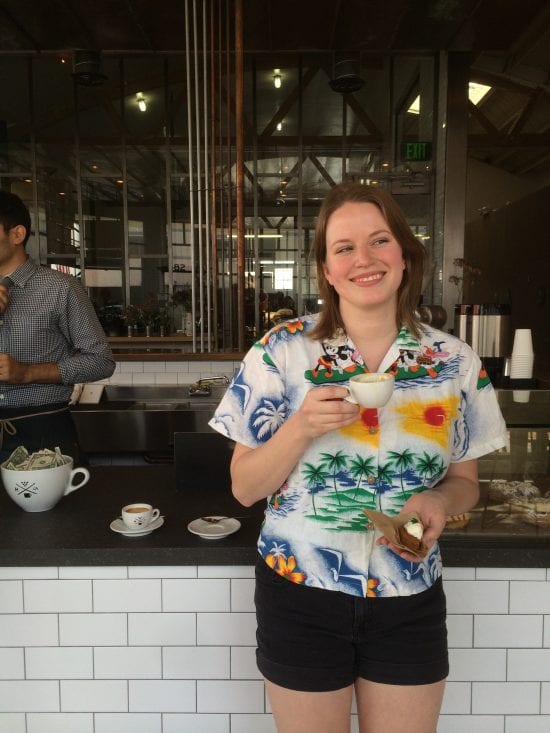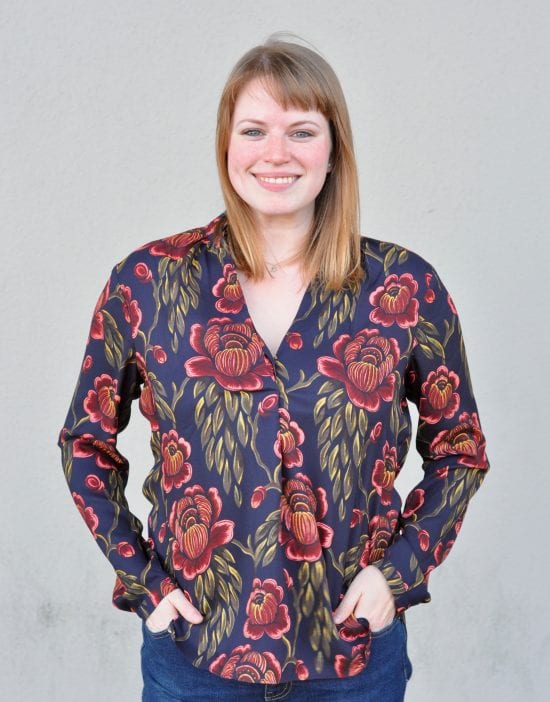
Elise Hogan reflects on her career, tells us what’s important in coffee, and shares the worst advice she’s received as she transitions from coffee to business school.
BY ASHLEY RODRIGUEZ
BARISTA MAGAZINE ONLINE
Elise Hogan is a Bay Area coffee legend and one of my coffee heroes. After jumping in head first as director of Kalita USA, she has established herself as one of the most prominent voices for coffee and for equitable conditions for baristas and marginalized members of our community. She’s direct, she’s organized, and she gets things done—she’s changing gears and moving on from coffee to get her MBA, and in this “10 Minutes With” segment, I ask her to reflect on her coffee career, contemplate what’s next, and maybe give me a piece of advice or two.
Ashley Rodriguez: How did you get started in coffee?
Elise Hogan: I got started in coffee in college as a barista at a cafe called Rosey Jekes in Hanover, N.H. My first “real” job out of college was in finance, and I quickly learned that I did not have the moral (or immoral) fortitude to hang with a bunch of scumbags. I moved to D.C. for an unpaid internship after the sexual harassment at my job was too much to bear—honestly, I think I would have done anything else at that time to get out of there. My internship was at a defense think tank doing communications, and I picked up some shifts at a local coffee shop to make ends meet. I was hired by the manager, Alex Mason (now a partner at Press Coffee), at a coffee shop called Chinatown Coffee Company. As the unpaid internship turned into a paid internship which turned into a job, I couldn’t let go of being a barista; two years into my time in D.C., I made the jump full time into specialty coffee—moving to the Bay Area to do so.
I grew up biking to the local coffee shop (Maude’s in Gainesville, Fla.) much more often than my parents would like, where I developed some of my most meaningful relationships in my adolescence and also a deep appreciation for how coffee can truly build community. I mean blah blah blah what does it really mean to “build community,” we have talked about it to the point of robbing it of meaning, but I think it is something you just know.

AR: You’ve had an arguably successful career in coffee. Can you speak to how you got to where you are and what obstacles you’ve faced or lucky breaks you’ve gotten?
EH: I think the biggest obstacle I have faced professionally is that in a small- to medium-sized company owned by someone else, you hit the ceiling really fast. I am an ambitious person, and I think the lucky break that I got was meeting people (Nick Cho and Trish Rothgeb) who believed in my ability to run with the ball and take ownership of their business “as if it were my own” from the beginning. I started with them as director of Kalita USA, and I learned a lot in that role by screwing up. I was working with a company and business culture with which I had no working knowledge and trying to introduce their products in a foreign market. Once McCarthy won the World Brewers Cup in 2013 with a Kalita Wave, demand skyrocketed and I was in a position where I could not keep up with supply; I overpromised a lot and I had to learn on the job how to better manage the sales cycle.
Personally, the biggest challenge I have faced is an internalized shame about the nature of my work. When I would talk to some of my peers from college with “big girl jobs” in law or medicine, they would diminish my work as “weird” or “a big risk,” and oftentimes introduce me to other people by saying that I was a barista when in reality I was managing director of a business I had helped to build—I don’t say that to diminish the incredible hard work of baristas, but rather to say that I personally had worked hard to get to where I was in my career and it felt like that was just brushed aside. I once had a classmate of mine at a party tell me to “clean up the floor, you work in a cafe anyways,” after someone spilled a drink, and I think it was the deepest embarrassment I have ever felt.
AR: We often ask folks about their mentors and coffee heroes; have you ever gotten bad advice?
EH: Some bad advice I keep hearing from powerful women in coffee is the lean in/just do it rhetoric of just going out there and taking what you want. I think that they mean well, but that advice is not very helpful for a large swath of the population. There are institutional and societal factors that make that advice pretty condescending and insulting if the implication is that if you haven’t succeeded in your career that you just haven’t tried hard enough. I’m just going to say this—when I read Kyle Ramage describe the course of his career by saying that “doors just opened for him,” I was furious. I believe him! I’ve talked to plenty of other coffee professionals for whom that is the case, and maybe it has been for me, too, but I don’t doubt for a second that the door is open wider because I am a white, cis female who went to a good school. I take no credit for the accident of my birth.

AR: What do you want to be remembered for in coffee?
EH: I want badly to be brave and fierce. I want to be thought of as a creative thinker and a problem solver, but more than that as someone who is compassionate and honest. That does not mean that I think I am succeeding on all of those fronts, but that is how I would like to be remembered. I am fiercely competitive and very ambitious, and I have not always handled delicate situations gracefully, but I am always working to improve myself. Someone I worked with once told me that he thought I was the “original no bullshit bitch,” and I have since taken it on as inspiration or a personal calling card.
AR: What feels important to you in coffee? Where do you want to see the industry go?
In Trump’s America, the only things I can think of in regards to any business are rooted in the ongoing struggle for civil rights and the ongoing effort to combat climate change. I want to see the industry empower a diverse workforce and show by example what intentionality in the fight for equality for all people really looks like. It is going to take creative, hard work, but I know that we are all up to the task. I love coffee. It tastes good. However, I don’t care how good it tastes if your company only promotes white men. I don’t care how good your coffee tastes if you take spiteful and malicious legal action against your employees. I don’t care how good your coffee tastes if you abuse your power as a business owner and repeatedly sexually harass your employees. I don’t care how good your coffee tastes if you do not invest in hiring and business practices that make this world a better place.

AR: You’re leaving coffee to get an MBA. Can you tell us more about that decision? Will you come back to coffee?
EH: At some point I saw the road splitting for me: I could either start my own company or I could go back to school. I know that is somewhat binary thinking, but when I was asked, “What do you want to be when you grow up?” in elementary school, I responded, “I want to be my own boss, wear jeans to work, drink coffee, and read books.” Those goals have been refined over time but largely have remained constant. I just made the decision to try for consulting recruiting in business school because I am going to have to pay back those “big girl loans” and I think it will be important for me to learn how to employ strategic thinking across many different industries. I hope to have a long career and I want to make my next move fully informed.
Do I want to come back to coffee? Yes. In what capacity? I don’t know. The truth is, I am privileged enough to be going to one of the best business schools in the world, and I feel a responsibility toward corporate social responsibility and social impact. Operating from a place of power and privilege gives you great potential for change, and I am ready to think big. I know that I am taking on a huge challenge. Just recently there was a harrowing opinion piece on the real reasons women aren’t CEOs, and I know that I am about to endeavor on a Sisyphean quest to break the glass ceiling.


I have known this young lady since she was a kid. She has always been determined and talented. She WILL reach the moon only after examining it to make sure it is exactly where she wants to be!